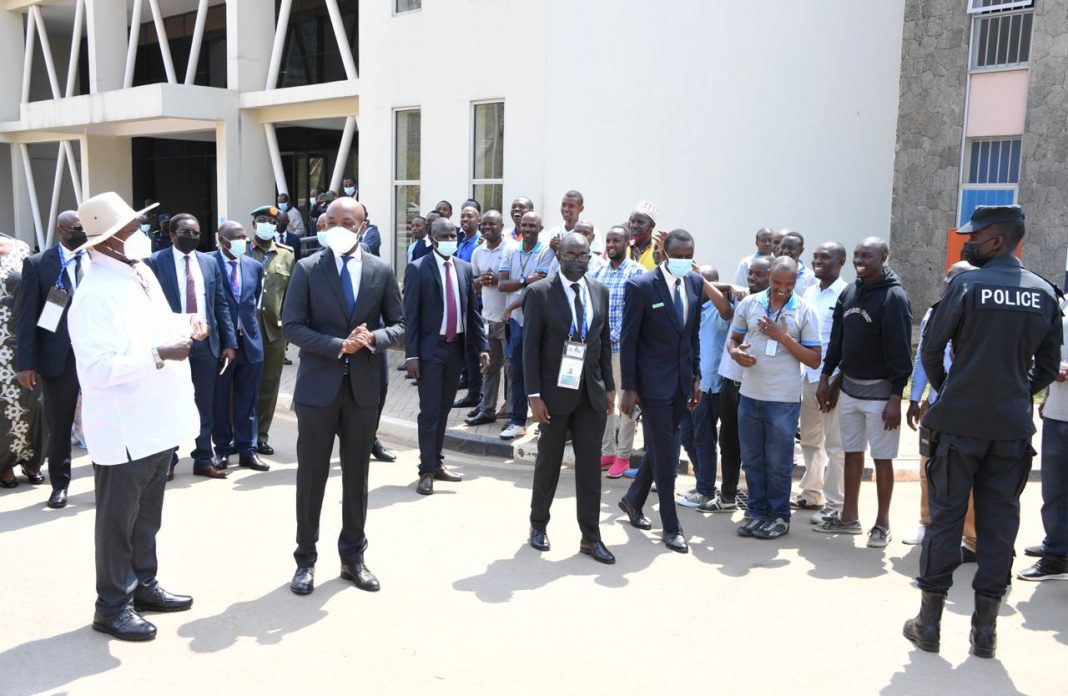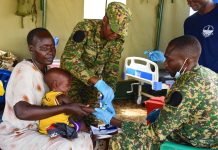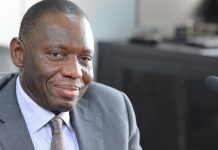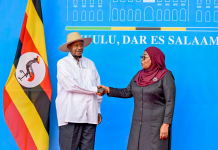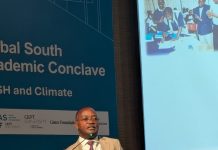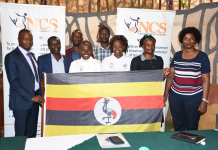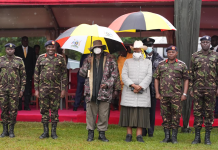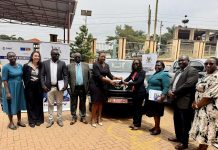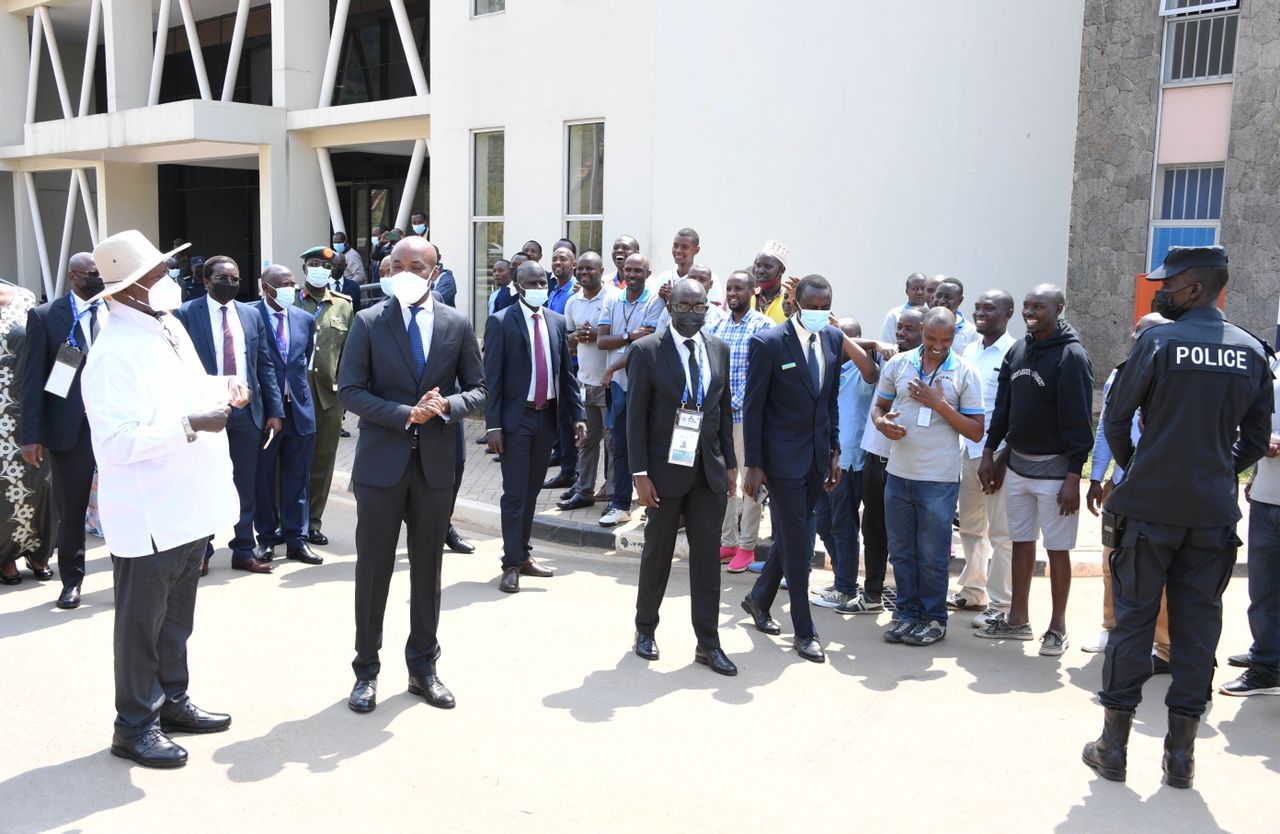
President Yoweri Museveni has today arrived in Rwanda’s Capital Kigali for a four day working visit during which he joins other heads of state for the ongoing Commonwealth Heads of Government Meeting (CHOGM).
The meeting is being held under the theme, “Delivering a Common Future: Connecting, Innovating, Transforming”
President Museveni who traveled by road from Uganda was received at the Gatuna One Stop Border Post by the Minister of Infrastructure of the Republic of Rwanda Eng. Erneste Nsabimana, Uganda’s High Commissioner to Rwanda H.E Maj. Gen (Rtd) Robert Rusoke, Governor of Northern Province Mr. Danielle Nyirarujero, Mayor of Gicumbi Mr. Emmanuel Nzabonimpa, Deputy Head of Mission Ms. Anne Katusiime, Defence Attaché at the High Commission of the Republic of Uganda in Rwanda Maj. Gen. Emmanuel Burundi Nyamunywanisa and Col.Deo Rusanganwa, Brigade Commander 501. Hundreds on people lined the streets of Kigali to receive him and almost blocked roads.
The President is due to attend the Commonwealth Business Forum Heads of Government and Business Leaders Roundtable at the Intare Conference Arena. Later he will host various bilateral meetings at his residency.
Leaders of Commonwealth countries meet every two years for the Commonwealth Heads of Government Meeting (CHOGM), hosted by different member countries on a rotating basis. Since 1971, a total of 24 meetings have been held including in Uganda in 2007 hosted by President Yoweri Kaguta Museveni, with the most recent being in the UK in 2018.
CHOGM currently going on and hosted by H.E Paul Kagame was due to take place in June 2020 but was postponed twice due to the COVID-19 pandemic.
Commonwealth Heads of Government Meeting 2022 is now taking place in Kigali, Rwanda. The official opening of CHOGM takes place on Friday 24 June and will be followed by the main high-level meetings of Heads on Friday 24 to Saturday 25 June. They are proceeded by four Forums, ministerial meetings, side events and other activities.
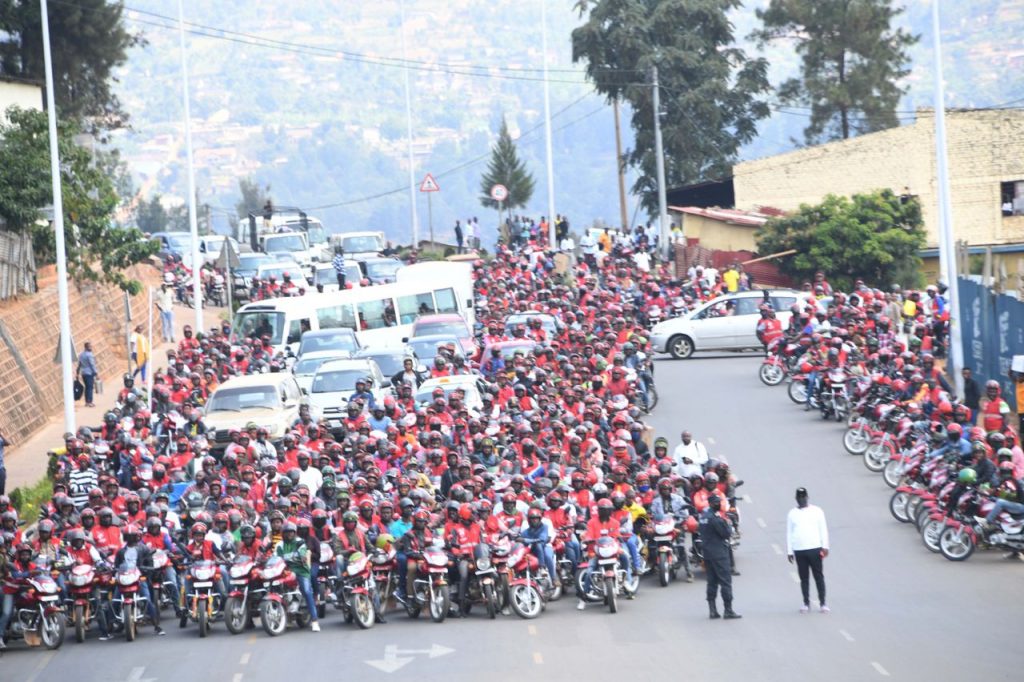

Today, at a special event coinciding with the Commonwealth Heads of Government Meeting (CHOGM), the Commonwealth Secretariat and The NO MORE Foundation were joined by HRH Duchess of Cornwall for the launch of new guidelines for the 54 Commonwealth countries to stop and prevent violence against women and girls (VAWG). The Commonwealth’s and NO MORE’s new recommended “Whole System Approach” strategy to help end VAWG and improve gender equality urges more consistent and effective collaboration between governments, civil society and the private sector. The effort builds on Commonwealth Says NO MORE initiative first launched in 2019 and comes at a critical time in the wake of the dramatic surge in domestic and sexual violence during the COVID-19 pandemic.
In addition to the keynote address given by HRH The Duchess of Cornwall, the event included several high-level speakers such as UN Deputy Secretary-General Amina Mohammed; HE Mrs Jeannette Kagame, First Lady of Rwanda; HE Dr Fatima Maada Bio, First Lady of Sierra Leone; The Rt Hon Patricia Scotland QC, Commonwealth Secretary-General; HE Mr Abdulla Shahid, President of the United Nations General Assembly; and Pamela Zaballa, Global CEO of The NO MORE Foundation.
A panel, moderated by Ghanaian actress and activist Joselyn Dumas, discussed several topics related to VAWG including the impact on mental health and the importance of engaging men and boys to be part of the solution. Also discussed was the Commonwealth’s facilitators guide to assess the economic costs of VAWG.
Globally one in three women and one in six men have experienced a form of domestic or sexual violence in their lifetime. Moreover, domestic, and sexual violence escalated and intensified during the COVID-19 pandemic. The impact of the pandemic on women and girls trapped in their homes is evident in the high-incidence calls to domestic violence helplines that increased up to 500% across Commonwealth countries during the pandemic. Ultimately, the Sustainable Development Goals, especially Goal 5 on achieving gender equality and empowerment of all women and girls, cannot be attained by 2030 without effectively addressing violence against women and girls.
In the keynote address, HRH The Duchess of Cornwall said:
“In the strength of our unity, we, the women and men of the Commonwealth, stand with victims and survivors, who, despite the temptation to hide away in silence, speak up so that others know they aren’t alone – whether in Africa, Asia, Europe, the Pacific or the Caribbean and Americas. In so doing, we have the opportunity to end gender-based violence and those laws and practices that discriminate against women. And each one of us must take personal responsibility not to let this opportunity be lost.”
The Commonwealth Secretary-General, the Rt Hon Patricia Scotland, QC, spoke about the devastating effects VAWG can have on survivors and their families:
“It carries a profoundly negative impact on women and girls’ participation in education, employment and civic life and undermines poverty reduction. It results in lost employment and productivity, and it drains resources from social services, the justice system, health-care agencies and employers. These are just some of the reasons that I have made tackling violence against women such a central part of my life.“
Speaking of the work of The NO MORE Foundation, CEO Pamella Zaballa said:
“The culture change needed to stop violence against women and girls is so vast that no single agency or organisation can make enough progress alone. We urgently need leaders to invest in long-term prevention strategies and commit to working collaboratively on them, engaging every government agency, NGOs and the private sector. That’s why NO MORE is joining with the Commonwealth Secretariat to urge all Commonwealth member countries to adopt a ‘whole system approach’ with the help of the toolkit we are launching today. Together, we have the collective power to make a real and lasting difference and achieve the SDG5.”
At the end of her speech, the Secretary-General concluded with these words:
“Each of us can be a leader, each of us can make change. By working together – listening to each other, inspiring each other – we can move forward with even greater determination to make sure everywhere in the world is safe for women – and nowhere is safe for those who commit violence against women.”


